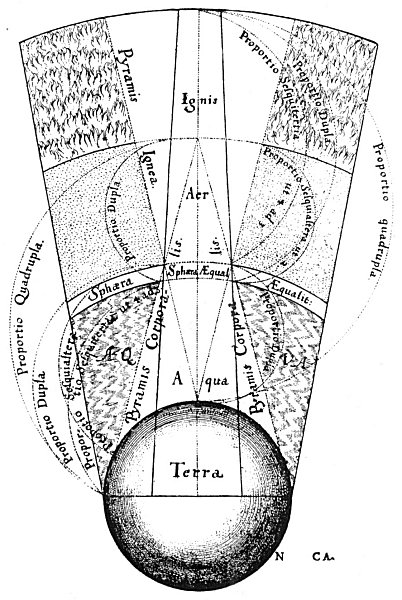File:Theory-of-elemental-music.jpg
The Theory of Elemental Music
From Fludd's De Musica Mundana
In this diagram two interpenetrating pyramids are again employed, one of which represents fire and the other earth. It is demonstrated according to the law of elemental harmony that fire does not enter into the composition of earth nor earth into the composition of fire. The figures on the chart disclose the harmonic relationships existing between the four primary elements according to both Fludd and the Pythagoreans. Earth consists of four parts of its own nature; water of three parts of earth and one part of fire. The sphere of equality is a hypothetical point where there is an equilibrium of two parts of earth and two parts of fire. Air is composed of three parts of fire and one part of earth; fire, of four parts of its own nature. Thus earth and water bear to each other the ratio of 4 to 3, or the diatessaron harmony, and water and the sphere of equality the ratio of 3 to 2, or the diapente harmony. Fire and air also bear to each other the ratio of 4 to 3, or the diatessaron harmony, and air and the sphere of equality the ratio of 3 to 2, or the diapente harmony. As the sum of a diatessaron and a diapente equals a diapason, or octave, it is evident that both the sphere of fire and the sphere of earth are in diapason harmony with the sphere of equality, and also that fire and earth are in disdiapason harmony with each other.
File history
Click on a date/time to view the file as it appeared at that time.
| Date/Time | Thumbnail | Dimensions | User | Comment | |
|---|---|---|---|---|---|
| current | 21:30, 13 February 2007 |  | 402 × 600 (76 KB) | WikiAdmin (Talk | contribs) | ''The Theory of Elemental Music''<br /> From Fludd's ''De Musica Mundana'' In this diagram two interpenetrating pyramids are again employed, one of which represents fire and the other earth. It is demonstrated according to the law of elemental harmony th |
- You cannot overwrite this file.
File usage
The following page links to this file:
